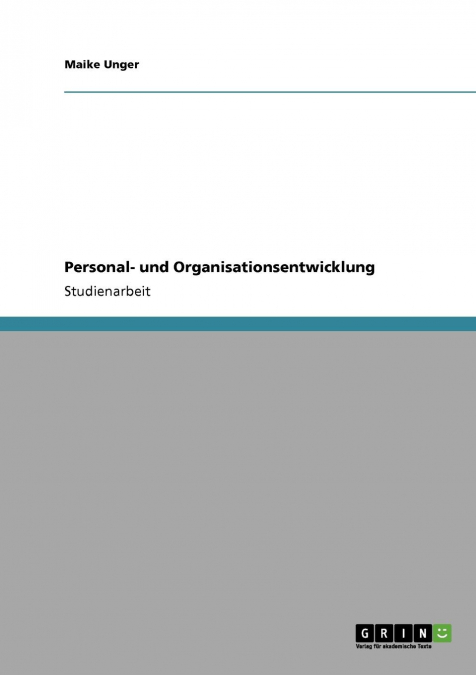
Maike Unger
Studienarbeit aus dem Jahr 2008 im Fachbereich Pädagogik - Berufserziehung, Berufsbildung, Weiterbildung, Note: 1,7, Universität Konstanz, Veranstaltung: Proseminar Berufliche Weiterbildung, Sprache: Deutsch, Abstract: Inhaltsverzeichnis i 1. Einleitung 1 2. Personalentwicklung 2 2.1. Analyse der Ausgangsbedingungen 2 2.1.1. Begriffsdefinition der Personalentwicklung 2 2.1.2. Ziele der Personalentwicklung 3 2.1.3. Wandel der Personalentwicklung 4 2.1.4. Abgrenzung der PE innerhalb des Personalwesens und zu anderen Einflussbereichen 5 2.1.5. Voraussetzungen für eine erfolgreiche Personalentwicklung 6 2.2. Durchführung der Personalentwicklung 7 2.2.1. System der Personalentwicklung 7 2.2.2. Bedarfs- und Potentialanalyse 7 2.2.3. Konzepte und Maßnahmen der PE 9 2.2.4. Personalentwicklungsplanung 12 2.3. Evaluation von Personalentwicklungsmaßnahmen 13 2.4. Kritik an der Personalentwicklung 14 3. Organisationsentwicklung 15 3.1. Grundlagen der Organisationsentwicklung 15 3.1.1. Begriff der Organisationsentwicklung 15 3.1.2. Ziele der Organisationsentwicklung 16 3.1.3. Gründe und Probleme der Organisationsentwicklung 17 3.1.4. Entwicklungsgeschichte der Organisationsentwicklung 18 3.2. Bausteine der Organisationsentwicklung 19 3.2.1. Ansätze der Organisationsentwicklung 19 3.2.2. Einteilungen der Ansätze der Organisationsentwicklung 19 3.2.2.1. Personaler Ansatz 20 3.2.2.2. Strukturaler Ansatz 21 3.2.3. Methoden der Organisationsentwicklung 21 3.2.3.1. Teamentwicklung 22 3.2.3.2. Survey-Feedback-Methode 22 3.2.3.3. Prozessberatung 23 3.2.3.4. Konfrontationstreffen 23 3.3. Der Organisationsentwicklungsprozess 24 3.3.1. Das Vorgehen/Umsetzung des Organisationsentwicklungsprozesses 24 3.3.1.1. Das Aktionsforschungsmodell 24 3.3.1.2 Das Drei-Phasen-Schema nach Lewin 24 3.3.1.3. Vier-Phasen-Modell des Organisationsentwicklungsprozesses 25 3.4. Kritik und Zusammenfassung 27 4. Die Lernende Organisation 28 4.1. Begriffsbestimmung und Grundgedanken 28 4.2. Ansätze zum organis